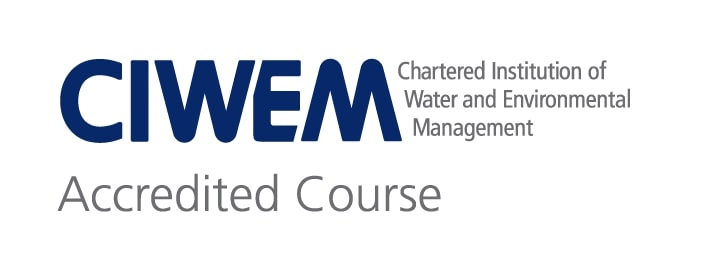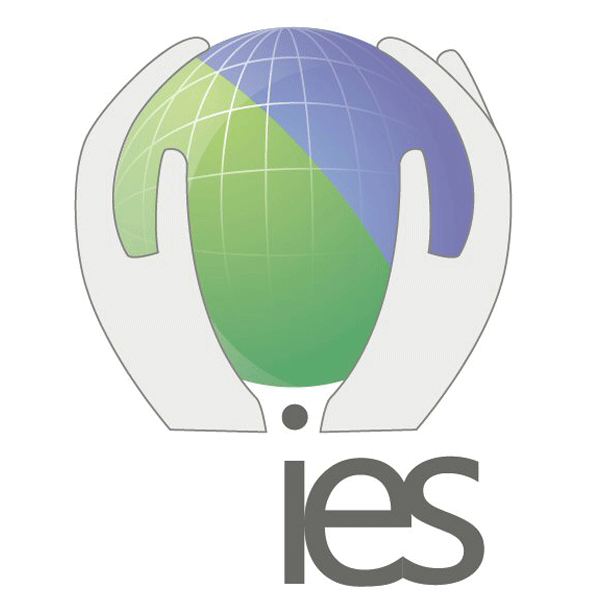Ecosystems Laboratories
The Ecosystems Laboratories process and analyse a range of environmental materials including soil, water, atmospheric gases, plants, compost and biodegradable wastes. We support OU research, but are also able to offer commercial analysis and development work where capacity allows.
The laboratories comprise experimental facilities, preparation areas, and analytical instruments, in the following areas:
- Biodegradability testing;
- Controlled environment chambers and greenhouses;
- Soil physics;
- Sample preparation and storage;
- Chemical preparation;
- Analytical;
- Field gas analysis.
1. Biodegradability
The Ecosystems biodegradability facility is dedicated to the analysis of biodegradable wastes and to furthering our understanding of the chemical and biological processes that characterise the decomposition, treatment, and environmental impact of new materials and biodegradable wastes.
Working in collaboration with the wider Ecosystems and STEM laboratories offers an extensive chemical characterisation service for organic wastes and soils as well as for gaseous and liquid emissions.
Biodegradability depends on the specific conditions in which a sample is held. We can determine biodegradability of samples in various environments including aerobic composting, anaerobic digestion, and natural environments such as soil and seawater.
1.1 Aerobic biodegradability
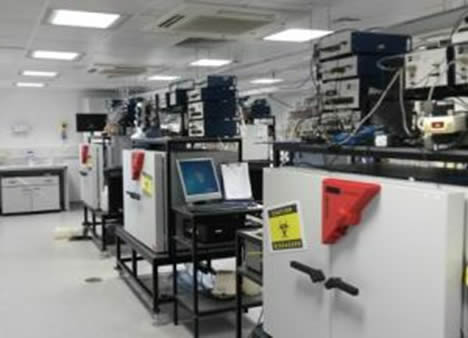
We have one of the leading respirometry facilities in Europe for the investigation of determination of biodegradability of waste and plastic materials (e.g. DR4 test for MBT assessment, PAS100 stability test, BS 14855 for plastics).
Our seven independent Sable Systems 16-channel modular respirometer systems allow online determination and logging of carbon dioxide, oxygen and methane under specific environmental conditions e.g. processing temperature and aeration. We have also developed a bespoke respirometry system for measuring soil carbon dioxide flux.
1.2 Anaerobic biodegradability
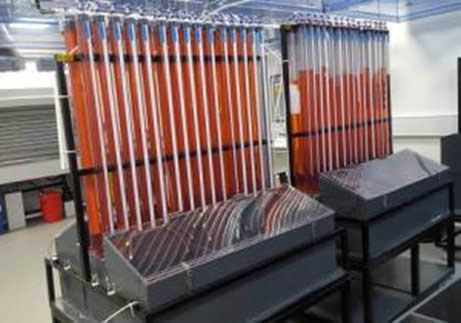
Our anaerobic biodegradability facility enables the determination of biodegradability of organic waste and plastic materials under anaerobic conditions by measurement of the biogas produced.
Test methods include BMc test for MBT assessment, the PAS100 RBP test and customised methods for new materials. Gas sampling ports allow the measurement of gas composition e.g. methane.
1.3 Compost facility
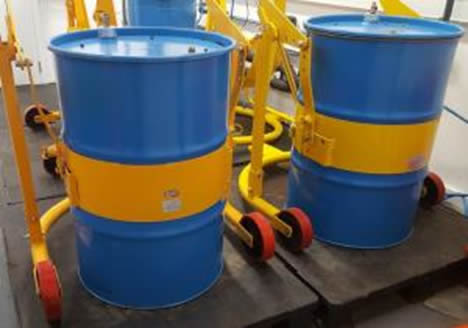
Our field site facility contains pilot-scale composting equipment which can be used for determining the degree of disintegration of plastic materials under defined composting conditions (e.g. BS 16929).
If you have any questions or want to find out more about our Biodegradability facilities, please contact Graham Howell.
2. Plant growth facilities
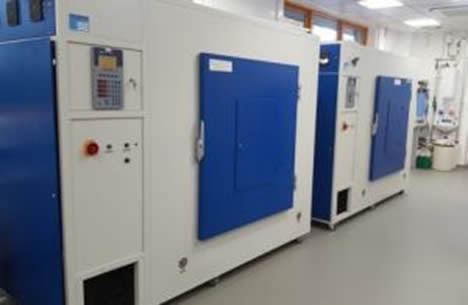
Our plant growing facilities range from outdoor mesocosm studies and greenhouses to controlled environment cabinets and a walk-in growth room.
We have two dedicated areas for mesocosm experiments totalling around 200 square metres in area. Water levels can be adjusted to mimic drought and flood conditions and weather conditions can be continuously monitored using our Davis Vantage Pro2 wireless weather station.
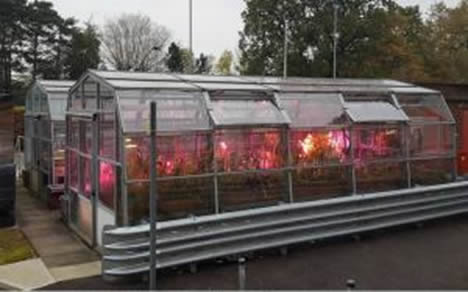
The controlled environment chambers (Snijders Microclima 1750) include capability to control humidity, temperature, lighting and CO2. In addition to controlling CO2 to sub-ambient levels, fumigation with pollutants such as ozone is also possible.
The larger Weiss plant growth chamber offers adjustable shelf and lamp loft height with precise light, humidity and temperature control.
2.1 Greenhouses
Each greenhouse is fitted with Phytolux Attis 7 and Attis 5 LED grow lights which are height adjustable and timer controlled.
If you have any questions or want to find out more about our Plant Growth Facilities, please contact Rebecca Shepherd.
3. Soil Physics
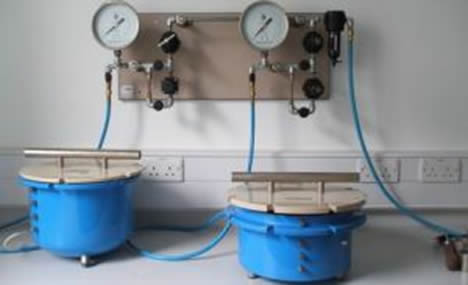
Our ecology laboratory is strictly temperature controlled, allowing soil and plant physical properties to be measured under standard conditions.
There is a range of kit for conducting these types of measurements including Sand tables and two pressure plate chambers (5 bar and 15 bar) for measuring soil water potential to create moisture release curves
If you have any questions or want to find out more about our Ecology facilities, please contact Rebecca Shepherd.
4. Sample Preparation
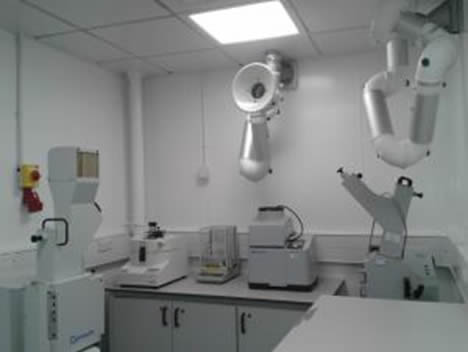
The key to any successful facility for environmental facilities, we hold a wide range of options for sample preparation.
A key instrument is the Cryomill (Retsch), cooled with liquid nitrogen and capable of grinding small samples of difficult materials such as plastics or fibrous materials.
A bespoke grinding room holds cutting mills both large (Retsch SM2000 and SM200) and small (Retsch ZM200).
5. Chemical Preparation
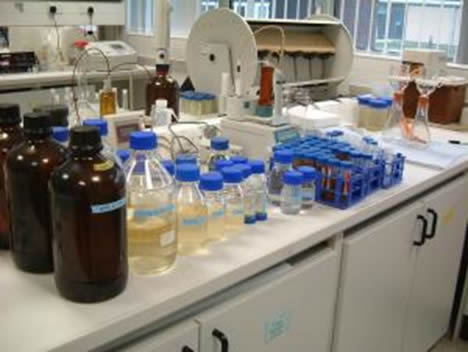
The chemical Preparation Lab is equipped with everything required for routine chemical preparations and measurements and includes:
- 3 x fume cupboards, including wash-downs;
- Spectrophotometer;
- Digestion blocks: Kjeldatherm;
- Microwave digester;
- Nitrogen distiller, Gerhardt Vapodest30.
If you have any questions or want to discuss the use of facilities/equipment in our Ecosystems Preparation Laboratories, please contact Nisha Panchal.
6. Analytical
Analytical facilities are integrated with the Geochemistry laboratories, extending the range of available analysis. The instruments most commonly relevant to Ecosystems research are:
- Metals analysis (e.g. ICP-AES);
- Gas Chromatography (GC);
- Ion chromatography (IC);
- Elemental analysis (Shimadzu TOC and Elemental Analyser);
- Fourier-Transform InfraRed (FT-IR) Spectroscopy.
If you would like to know more about our Ecosystems Analytical Laboratories, please contact Nisha Panchal (chromatography) or Tim Barton (elemental analysis).
7. Field gas analysis
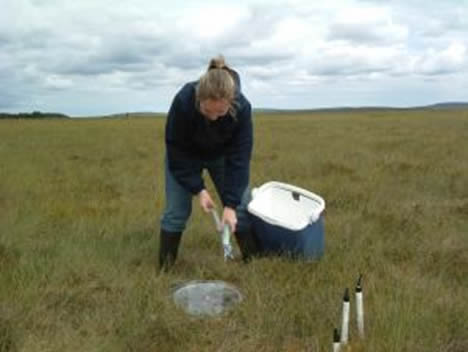
Our field gas analysis facilities include:
- FTIR Fourier Transform Infra-Red gas analyser (Gasmet DX4000 with Sampling System);
- Los Gatos Fast Methane Analysers;
- PPsystems Ciras CO2;
- Hydrogen sulphide gas analyser (Jerome 631-X);
- Anemometers (TA460P, TA465P, TSI instruments);
- A range of gas sampling equipment including nitrogen dilution for difficult gas streams.
If you have any questions or want to find out more about our Field Gas Analysis facilities, please contact Graham Howell.
News
Celebrating Graduation in Manchester
On 22 November Professors Clare Warren, Mark Brandon and Richard Holliman, and Dr Barbara Kunz travelled to Manchester for an OU Graduation Ceremony.
EEES researcher to lead £800k project to improve global climate change predictions
An EEES researcher is leading a new Natural Environmental Research Council-funded project to improve our ability to predict climate change using cutting-edge analysis of fossilised algae molecules.


